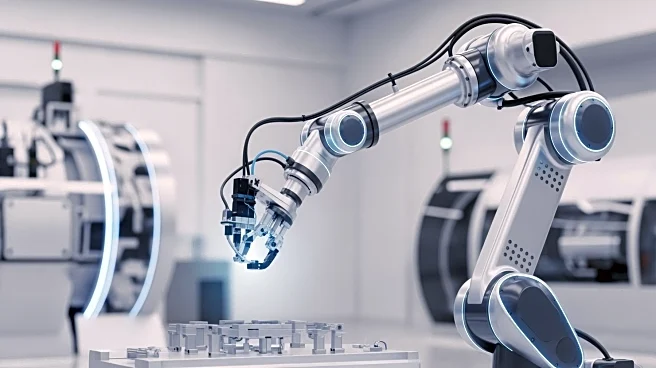What's Happening?
Manufacturers are increasingly adopting Agentic AI to address challenges such as rising costs, fragile supply chains, and sustainability demands. Unlike generative AI, which focuses on content creation,
Agentic AI systems can autonomously analyze, decide, and act, functioning as digital colleagues within manufacturing processes. These agents are deployed in various roles, including procurement, production scheduling, quality control, and maintenance, delivering measurable impacts like increased uptime and reduced costs. The adoption of Agentic AI is seen as a journey, starting with low-risk functions and expanding to complex, cross-functional processes, ultimately aiming for a fully closed-loop system that connects design, production, and service.
Why It's Important?
The integration of Agentic AI in manufacturing is significant as it promises to transform traditional linear value chains into more resilient and efficient systems. By automating repetitive tasks, manufacturers can focus on innovation and problem-solving, potentially achieving substantial reductions in maintenance costs and energy use, alongside improvements in productivity and quality management. This shift not only enhances competitiveness but also aligns with growing demands for sustainability and new service-based revenue models. The adoption of Agentic AI could position manufacturers to better absorb global disruptions and maintain industry leadership.
What's Next?
Manufacturers are expected to continue scaling Agentic AI across their operations, leveraging platforms like Salesforce Data Cloud to unify data and orchestrate intelligence. As confidence in these systems grows, the scope of AI agents will likely expand, enabling more complex integrations and collaborations across functions. By 2035, the industry could see significant advancements, such as self-healing supply chains and predictive quality management, potentially eliminating large-scale recalls and halving energy intensity. This evolution is not only a strategic necessity but also an opportunity to elevate national manufacturing capabilities on a global scale.
Beyond the Headlines
The adoption of Agentic AI raises ethical and workforce considerations, as it shifts the role of human workers from manual tasks to more strategic and creative functions. This transition requires careful management to ensure that employees are equipped with the skills needed to work alongside AI systems. Additionally, the reliance on AI for decision-making and action introduces new challenges in governance and accountability, necessitating robust frameworks to manage AI-driven processes and outcomes.








